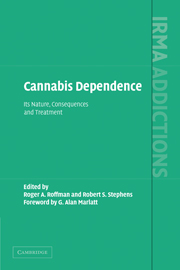Book contents
- Frontmatter
- Contents
- List of Contributors
- Acknowledgments
- Executive Summary
- Foreword
- Part I The Nature of Cannabis Dependence
- 1 Themes in the History of Cannabis Dependence
- 2 The Diagnosis of Cannabis Dependence
- 3 Understanding the Pharmacology and Physiology of Cannabis Dependence
- 4 The Epidemiology of Cannabis Dependence
- 5 The Adverse Health and Psychological Consequences of Cannabis Dependence
- Part II Interventions with Cannabis-Dependent Adults
- Part III Interventions with Cannabis-Dependent Adolescents and Young Adults
- Part IV Policy
- Part V Conclusion
- Index
5 - The Adverse Health and Psychological Consequences of Cannabis Dependence
from Part I - The Nature of Cannabis Dependence
Published online by Cambridge University Press: 29 October 2009
- Frontmatter
- Contents
- List of Contributors
- Acknowledgments
- Executive Summary
- Foreword
- Part I The Nature of Cannabis Dependence
- 1 Themes in the History of Cannabis Dependence
- 2 The Diagnosis of Cannabis Dependence
- 3 Understanding the Pharmacology and Physiology of Cannabis Dependence
- 4 The Epidemiology of Cannabis Dependence
- 5 The Adverse Health and Psychological Consequences of Cannabis Dependence
- Part II Interventions with Cannabis-Dependent Adults
- Part III Interventions with Cannabis-Dependent Adolescents and Young Adults
- Part IV Policy
- Part V Conclusion
- Index
Summary
People who become dependent on cannabis are more likely than infrequent users to experience any of the adverse health effects that are caused by chronic cannabis use. Dependent cannabis use is rare in comparison with the more prevalent pattern of experimental and intermittent use (Bachman et al., 1997), but it may nonetheless affect as many as 1% of adults in the USA and Australia in any 1 year (Anthony et al., 1994; Hall et al., 1999a). Dependent cannabis users typically smoke two or more cannabis cigarettes a day over periods of years or decades in a minority of cases (Copeland et al., 2001; Solowij, 2002; Swift et al., 1998b).
This chapter summarizes the most probable adverse health effects that cannabis-dependent persons are at increased risk of experiencing. With few exceptions (e.g., Solowij et al., 2002; Taylor et al., 2000), the literature does not directly assess the adverse health effects of cannabis dependence. The most probable effects can nonetheless be inferred from the more common studies of the effects of long-term daily cannabis use because many daily users are dependent on cannabis (Swift et al., 1998a, 2001). The chapter reviews evidence on the adverse health effects of more or less daily use over periods of years during young adulthood, and among those who seek treatment in their mid-thirties who have used cannabis more or less daily for the past 15–20 years.
Keywords
- Type
- Chapter
- Information
- Cannabis DependenceIts Nature, Consequences and Treatment, pp. 106 - 128Publisher: Cambridge University PressPrint publication year: 2006
- 3
- Cited by



